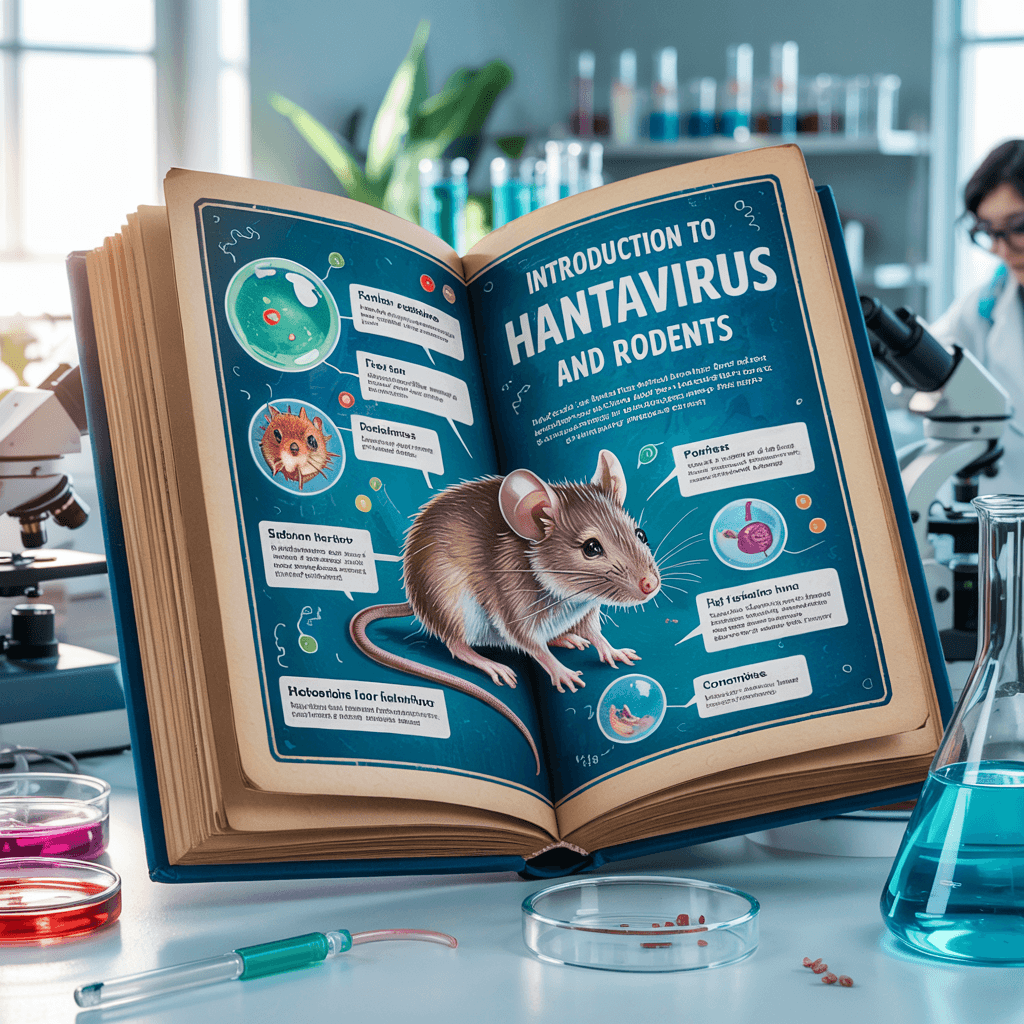Introduction to Hantavirus and Rodents
Hantavirus is a serious public health concern that affects humans worldwide, particularly those who come into contact with rodents or their contaminated environments. This virus is transmitted primarily through the inhalation of aerosolized particles from rodent urine, feces, or saliva. Understanding the relationship between hantavirus, rodents, and human health is crucial for preventing outbreaks and mitigating risks. In this blog post, we will delve into the details of hantavirus, its impact on human health, and how professional pest control services like Dade Pest Solutions can help protect individuals and communities from this threat.
What is Hantavirus?
Hantavirus is a type of negative-sense, single-stranded RNA virus belonging to the family Hantaviridae and genus Orthohantavirus. It is primarily hosted by rodents, which can carry the virus without showing symptoms. The virus is shed in the rodents’ urine, feces, and saliva, posing a significant risk to humans who come into contact with these contaminated materials.
Types of Hantavirus Diseases
Hantaviruses cause two main types of diseases in humans:
- Hantavirus Pulmonary Syndrome (HPS): This is a severe respiratory disease characterized by symptoms such as fever, muscle aches, and difficulty breathing. It progresses rapidly and can lead to severe lung and heart problems, including pulmonary edema and cardiac failure.
- Hemorrhagic Fever with Renal Syndrome (HFRS): This disease primarily affects the kidneys, causing symptoms like fever, renal failure, and hemorrhaging. It is more common in Asia and Europe, where different strains of the virus are prevalent.
Symptoms of Hantavirus Pulmonary Syndrome (HPS)
HPS symptoms typically develop within 1 to 8 weeks after exposure to the virus. The disease progresses through distinct phases:
- Early Symptoms: These include fever, chills, muscle aches, headaches, nausea, vomiting, diarrhea, and abdominal pain. These symptoms are often mistaken for the flu, making early diagnosis challenging.
- Late Symptoms: As the disease advances, patients may experience a dry cough, severe breathing difficulties, low blood pressure, and irregular heart rate. The lungs fill with fluid, leading to severe respiratory distress and potential organ failure.
How Hantavirus is Transmitted
Hantavirus transmission to humans primarily occurs through inhalation of aerosolized particles from contaminated rodent waste. This can happen in confined spaces where rodent activity is high, such as in homes with infestations or in outdoor environments where rodents are prevalent. Other modes of transmission include direct contact with contaminated materials and, rarely, bites from infected rodents.
The Role of Rodents in Hantavirus Transmission
Rodents are the natural reservoirs of hantavirus. They shed the virus in their urine, feces, and saliva without showing symptoms themselves. The virus can survive in the environment for several hours, especially in moist conditions, increasing the risk of transmission to humans.
Common Rodent Species Involved
Several rodent species are known to carry hantavirus, including:
- Deer Mice: These are common carriers of the Sin Nombre virus, which causes HPS in the United States.
- Rats and Mice: These rodents can carry different strains of hantavirus, contributing to the spread of HFRS in various parts of the world.
Impact of Hantavirus on Human Health
Hantavirus infections can have devastating effects on human health, particularly due to the severity of HPS. The disease has a high mortality rate if not treated promptly and effectively. Understanding the risks and taking preventive measures are crucial for protecting public health.
Public Health Concerns
- Mortality Rate: HPS has a mortality rate of approximately 36% in the United States, highlighting the need for early detection and treatment.
- Global Prevalence: Hantavirus infections affect over 200,000 people worldwide annually, with cases increasing due to environmental factors and rodent population dynamics.
Preventive Measures Against Hantavirus
Preventing hantavirus exposure involves reducing contact with rodents and their contaminated environments. Here are some key strategies:
- Rodent Control: Eliminating rodent infestations is crucial. This involves sealing entry points, removing food sources, and using traps or repellents.
- Sanitation: Cleaning areas contaminated with rodent waste requires caution. Use protective gear and disinfectants to minimize aerosolization of the virus.
- Ventilation: Ensure good ventilation in areas where rodent activity is suspected to reduce the concentration of airborne virus particles.
How Dade Pest Solutions Can Help
Dade Pest Solutions offers comprehensive rodent exclusion and sanitation services designed to protect homes from rodent infestations and the associated risks of hantavirus transmission.
Rodent Exclusion Services
- Inspection: Our technicians conduct thorough inspections to identify rodent entry points and nesting areas.
- Sealing Entry Points: We seal all openings to prevent re-infestation, ensuring a rodent-free environment.
- Trapping and Removal: We use humane and effective methods to remove existing rodents, minimizing the risk of disease transmission.
Sanitation Services
- Disinfection: Our team safely disinfects areas contaminated with rodent waste, using appropriate protective gear and disinfectants.
- Ventilation: We ensure that areas are well-ventilated to reduce the risk of airborne virus transmission.
- Preventive Measures: We provide guidance on maintaining a clean environment and preventing future infestations.
Benefits of Choosing Dade Pest Solutions
- Expertise: Our technicians are highly trained in rodent control and sanitation techniques.
- Safety: We prioritize the safety of our clients, their pets, and the environment by using eco-friendly methods.
- Customized Solutions: Each service is tailored to the specific needs of the client, ensuring effective and lasting results.
Conclusion
Hantavirus poses a significant threat to human health, particularly in regions with high rodent activity. Understanding the risks and taking proactive measures to prevent exposure are essential for protecting communities. Dade Pest Solutions offers comprehensive services to help individuals and businesses mitigate these risks by controlling rodent infestations and ensuring sanitation. By choosing professional pest control services, you can safeguard your health and well-being while creating a pest-free living environment.
Additional Tips for Homeowners
- Regular Inspections: Regularly inspect your home for signs of rodents, such as droppings or gnaw marks.
- Seal All Entry Points: Use steel wool or caulk to seal any holes or gaps around your home.
- Clean Up Clutter: Keep your home clean and clutter-free to reduce hiding places for rodents.
- Use Traps: Consider using humane traps if you suspect rodent activity.
- Call Professionals: If you suspect a severe infestation, contact a professional pest control service like Dade Pest Solutions.
By following these tips and utilizing professional services, you can effectively reduce the risk of hantavirus exposure and maintain a safe and healthy environment for you and your family.
Frequently Asked Questions (FAQs)
Q: What is the primary mode of hantavirus transmission?
A: Hantavirus is primarily transmitted through the inhalation of aerosolized particles from rodent urine, feces, or saliva.
Q: Which rodents are most commonly associated with hantavirus?
A: Deer mice are common carriers of the Sin Nombre virus, which causes HPS in the United States. Rats and mice can also carry different strains of hantavirus.
Q: How can I prevent hantavirus exposure in my home?
A: Prevent exposure by sealing entry points, removing food sources, using traps, and ensuring good sanitation and ventilation. Regular inspections and professional pest control services can also help.
Q: What are the symptoms of Hantavirus Pulmonary Syndrome (HPS)?
A: Early symptoms include fever, chills, muscle aches, headaches, nausea, vomiting, diarrhea, and abdominal pain. Late symptoms can include severe breathing difficulties and low blood pressure.
Q: How effective are Dade Pest Solutions’ services in preventing hantavirus transmission?
A: Dade Pest Solutions offers comprehensive rodent exclusion and sanitation services that are highly effective in reducing the risk of hantavirus transmission by eliminating rodent infestations and ensuring a clean environment.
Q: Can hantavirus be transmitted from person to person?
A: Hantavirus is not typically transmitted from person to person. The primary risk is through contact with contaminated rodent waste.
Q: What should I do if I suspect a rodent infestation in my home?
A: If you suspect a rodent infestation, contact a professional pest control service like Dade Pest Solutions for safe and effective removal and prevention strategies.
Q: How long does hantavirus survive in the environment?
A: Hantavirus can survive in the environment for several hours, especially in moist conditions. Proper disinfection and ventilation are crucial for reducing the risk of transmission.
Q: Are there any treatments available for hantavirus infections?
A: While there are no specific treatments for hantavirus infections, early medical intervention can significantly improve outcomes. Supportive care, such as oxygen therapy and fluid management, is often provided to manage symptoms.
Q: Can pets get hantavirus?
A: Pets are not typically at risk of contracting hantavirus. However, they can carry rodents that may be infected, so it’s important to keep pets away from areas with rodent activity.
Q: How often should I inspect my home for rodents?
A: Regular inspections should be conducted at least monthly, focusing on areas where rodents are most likely to be present, such as attics, basements, and near food sources.
Q: What are the benefits of using professional pest control services for rodent infestations?
A: Professional services like Dade Pest Solutions provide expertise in safely removing rodents and sanitizing contaminated areas, reducing the risk of hantavirus transmission and ensuring a long-term solution to pest problems.

